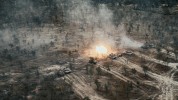Search
Using the filters to the left, click your selection, it will become bold and filter the results, click it again to remove that filter.
The Utility of Mission Command within Domestic Security and Response Operations The land domain is where people live, where decision makers reside and where human, physical and technical access to all other domains begins. It is where military action intersects with populations and audiences. It encompasses decisive terrain and hosts critical infrastructure. [1] Domestic operations have unique characteristics and considerations. [2] Introduction Associate Professor David Stahel’s ‘ Auftragstaktik : The …

This paper draws on material covered in John Blaxland, The Australian Army from Whitlam to Howard (CUP, 2014). [1] Soldiers of today’s Australian Army draw on the inspiration of their predecessors. Following British tactics and procedures for the first half of the 20th century and beyond, Australian soldiers have fought at the direction of their government in conflicts and places ranging from the Anglo-Boer War in South Africa from 1899 to 1902, to Gallipoli in 1915, Beersheba in 1917 and Amiens in 1918, …

The Australian Army is a proud institution—shaped by generations of service, sacrifice and adaptation. The challenges of a rapidly evolving strategic environment demand that we reflect on our identity, our legitimacy and our relationship with the nation and society we exist to serve. This edition of the Australian Army Journal aligns with the theme of the 2025 Chief of Army’s Symposium, ‘The Army in Society ’ , and marks a milestone in our ongoing journey of professional renewal and national dialogue. …
Keogh Chair and Allis Chalmers Professor of Political Science at Marquette University Chief of Army Symposium 2025, Australian Parliament House, 26 August 2025 Good morning, everyone. Thank you, Brigadier Campbell, for that kind introduction. I would also like to thank Lieutenant General Stuart for inviting me to be here today, and his team, who have welcomed me so graciously. I am delighted to visit your beautiful country. It is my great honor today to speak to you on the relationship between army and …
Lieutenant Colonel Dr Adam J Hepworth, PhD is Director of the Army RICO. In this role, Adam leads the advancement of emerging technology, including robotics, autonomous systems, AI and autonomy for the Australian Army. Adam holds a Bachelor of Science in Mathematics from the University of New South Wales, a Master of Logistics and Supply Chain Management from the University of South Australia, a Graduate Diploma in Scientific Computation and a Master of Science in Operations Research from the United States …

Callum Hamilton is AI Policy Lead of the Australian Army Robotics and Autonomous Systems Implementation Coordination Office (RICO) within Future Land Warfare Branch. In this role, Callum supports the Australian Army’s responsible application and use of AI and autonomous systems in the land domain. Callum holds a Bachelor of Laws (Honours) and Bachelor of International Relations from Bond University and is currently completing a Graduate Diploma of Legal Practice at the College of Law. … Callum …
Dr Carl Rhodes is the founder of Robust Policy and a senior fellow with the National Institute for Deterrence Studies . He hosts the Deterrence Down Under podcast and previously served for 25 years with RAND Corporation. … Carl Rhodes …
Australian Operations to Degrade the Islamic State—2014–2024 Executive Summary Beginning in 2014, the Australian Defence Force (ADF) was committed to Operation Okra in the Middle East, with the aim of degrading the Islamic State, ISIS, or Daesh. This objective was ultimately achieved in 2018, although ongoing operations monitoring the threat have since continued. It has now been a decade since the commencement of this intervention, which the ADF formally concluded in December 2024. The Chief of Defence …
Lieutenant Colonel Aaron P Jackson PhD is Senior Research Officer at the Australian Army Research Centre. A SERCAT 5 (i.e., part time) Infantry officer, he is a former Commanding Officer of 10th/27th Battalion, The Royal South Australia Regiment. He has deployed on Operation Okra (Iraq), Operation Astute (Timor Leste), Operation Resolute (Australian border security), and Operation COVID-19 Assist (domestic emergency response). In his civilian employment, Dr Jackson is Senior Lecturer in War Studies at …

